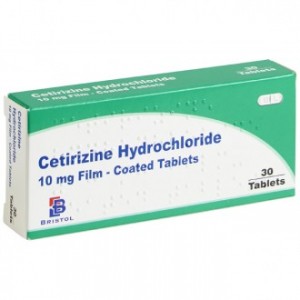How many Cetirizine can you take in a day?
Affecting 29% of the UK population, hay fever is typically a seasonal allergy. Known medically as allergic rhinitis, the condition occurs when the immune system fires chemicals called histamines, which result in inflammation of the nasal passages. This immune response also causes the indicative hay fever symptoms like sneezing, coughing, difficulty breathing from your nose, itchy, watery eyes and a general feeling of lethargy.
One common treatment for hay fever is Cetirizine, a non-drowsy antihistamine which is commonly sold under the brand names Zirtek, Piriteze and Benadryl Allergy. It is available in the form of tablets, capsules and syrups. Cetirizine can help relieve hay fever symptoms, but it cannot prevent them from occurring in the first place.
For many, Cetirizine is only taken when the pollen count is high and not every day. But this can make it difficult to determine how often you should take Cetirizine. Read on to find out how much you should take as well as other helpful tips on taking Cetirizine for hay fever.
Cetirizine
- Reduces hayfever symptoms
- Taken once daily
- Non-sedating antihistamine
What is cetirizine for?
Cetirizine is an antihistamine that’s used to relieve allergy symptoms associated with:

When your body comes into contact with an allergen, it produces a chemical called histamine, which causes allergy symptoms. An antihistamine, like cetirizine, stops histamine binding to its receptors in the body, stopping allergy symptoms from developing.
How much Cetirizine can you take in a day?
How much Cetirizine you can take in a day is dependent on factors such as your age and severity of symptoms. The dosage usually differs for adults and children. Normally, if you are younger than 65 years, you may be good to go with one tablet a day (with the maximum dose being 10 mg per day). However, if you are over 65 years of age or suffer from any kidney problems, then your daily dose of Cetirizine would usually be lower, around 5 mg per day.
You can take Cetirizine regularly to keep your symptoms at bay, especially in spring and summer when the pollen count is high. However, it’s important to always follow your doctor’s instructions or check the label for information on how much Cetirizine you should take.
You should avoid accidentally taking more Cetirizine if your symptoms persist. If you find that Cetirizine does not effectively relieve your symptoms, speak to your doctor or a pharmacist for advice.
How to take Cetirizine
Cetirizine can be taken with or without food, but you should always swallow them whole with a drink. You should never try to chew them.
How much Cetirizine can you take in a day if you forget your first dose?
If you forget to take Cetirizine, take it as soon as you remember. However, if it is nearly time for your next dose, you should refrain from doing so. You should never take a double dose in order to make up for a forgotten dose.
What happens if you accidentally take too much Cetirizine?
If you accidentally take more Cetirizine than you should, it is unlikely to cause any serious harm to you. However, it may put you at an increased risk of experiencing side effects, such as nausea, drowsiness, headaches, stomach aches, and feeling agitated or nervous. If you experience any side effects and you feel concerned, you should speak to your doctor.
If your side effects persist or become gradually worse, you should seek emergency medical attention by going straight to your nearest accident and emergency department.
However, if you feel that the usual dosage of Cetirizine is not working out for you and you deliberately try to overdose in the hopes of relieving hay fever symptoms, you should immediately discontinue with this practice. You can explore other hay fever treatments alongside your regular dose of Cetirizine.
Is it safe to take Cetirizine with other antihistamines?
Taking Cetirizine together with other antihistamines such as fexofenadine and loratadine is generally not recommended and can increase the chances of side effects. However, your doctor may recommend a sedating antihistamine to help you sleep at night.
Side Effects and Precautions
Cetirizine has fewer side effects than other hay fever medicines. Common side effects of taking Cetirizine may include tiredness, dizziness, abdominal pain, headaches, nausea, dry mouth and diarrhoea.
Do not take Cetirizine if you are allergic to peanuts or soya.
You should avoid drinking alcohol while taking Cetirizine as it can increase the risk of making you feel drowsy, dizzy or nauseous.
It is important to tell your doctor about your medical history before taking Cetirizine. You should tell your doctor if you use other medicines, especially sleeping pills, muscle relaxants, anti-depressants or other cold or allergy medications.
They can add to the drowsiness caused by Cetirizine. Also, you should not take Cetirizine without informing your doctor if you are breastfeeding, since small amounts of Cetirizine can pass into the mother’s breast milk and prove harmful to the nursing baby.
Does cetirizine cause drowsiness?
No, cetirizine has a non-drowsy formula, so it is a good option for hayfever sufferers who need to stay alert and focused during the day, perhaps for work.
Some antihistamine medications can make you feel sleepy. These include chlorphenamine, diphenhydramine, hydroxyzine, and promethazine.
Generally, non-drowsy formulas are the best option because they are less likely to make you feel sleepy. However, if your allergy symptoms are affecting your sleep, antihistamines that make you drowsy may be more suitable. You should discuss the most suitable option for you with a clinician or pharmacist.
Cetirizine doses
Cetirizine is available as 10 mg tablets or as a liquid solution.
| Dose | Form | Suitable for |
|---|---|---|
| 10 mg | Tablets | Adults and children over 12 |
| 10 mg (5 mg x 2) | Tablet or liquid medicine | Children aged 6 to 12 years |
| 5 mg (½ tablet once per day) | Tablet or liquid medicine | People with mild kidney issues |
How long can I take cetirizine for?
How long you will need to take cetirizine will depend on your symptoms. For example, if you are taking cetirizine tablets to relieve hayfever symptoms, it’s a good idea to start taking them up to four weeks before you usually experience them.
In the UK, this is usually during spring and summer. You’ll likely need to continue taking antihistamines throughout the pollen season to keep symptoms at bay, usually until mid-September.
How common is hay fever?
It is estimated that around one in four adults and 1 in 10 children experience hay fever. The symptoms usually present from early spring until late autumn and are usually worse in warm, windy, and humid weather.
What are the common hay fever symptoms?
Hayfever symptoms include:
- A runny or blocked nose
- Sneezing
- Coughing
- Itchy, red or watery eyes
- Itchy throat, mouth, nose, and ears
- Headache
- Loss of smell
- Tiredness
Unlike common colds, hayfever symptoms usually last for weeks or months. So, if you’ve had any of the above symptoms for more than two weeks, and it’s pollen season, you could have hay fever.
Find out ‘What’s the difference between hay fever and a cold?’
Tips for treating hay fever symptoms at home
There is no cure for hayfever, but there are things you can do to help ease your symptoms, such as:
- Rubbing petroleum jelly around your nostrils to trap pollen and stop it entering your airways
- Wear wraparound sunglasses or a wide-brimmed hat
- Keep windows and doors closed inside as much as possible
- Vacuum frequently and dust with a damp cloth to trap dust and pollen
- Shower and change your clothes after going outside
- Avoid cutting or walking on grass
- Avoid drying clothes outside
- Drink plenty of fluids to stay hydrated
Learn more ways in our guide ‘5 tips to beat hay fever’.
What if cetirizine doesn’t work for me?
If you feel cetirizine isn’t relieving your hayfever symptoms, speak to a clinician for further advice. They may recommend that you try a different antihistamine medicine.
Cetirizine alternatives
You can buy cetirizine from Prescription Doctor, but if you feel it isn’t working for you, speak to one of our clinicians about the other hayfever treatments we offer:
| Antihistamine | Brands |
|---|---|
| Fexofenadine hydrochloride | Allevia, Telfast, Treathay |
| Beclomethasone dipropionate | Beconase Aqueous Nasal Spray, Nasobec Aqueous Nasal Spray |
| Cetirizine dihydrochloride | Benadryl Allergy |
| Cetirizine hydrochloride | Piriteze allergy tablets, Zirtek allergy |
| Loratidine | Clarityn |
| Desloratadine | Neoclarityn |
| Azelastine hydrochloride and fluticasone propionate | Dymista Nasal Spray |
| Chlorphenamine maleate | Piriton allergy tablets |
Sources
Dr Reddy’s Laboratories (UK) Ltd, 2024. Cetirizine hydrochloride 10 mg tablets package leaflet
Met Office, 2024. Surviving hay fever: A guide for sufferers
NHS, 2024. Hay fever
NHS, 2023. Antihistamines
NHS, 2021. Cetirizine
Authored & Reviewed By

Mohamed Imran Lakhi
MPharm - Lead PharmacistPublished on: 30/08/2019 Reviewed on: 02/07/2024
© 2013 - 2025 Al Muhsineen Limited. All Rights Reserved. Registered Pharmacy: 34 Halliwell Road, Bolton BL1 8RL. Registered Office: 254 First Floor, Shearbrow, Blackburn, England, BB1 8DS






